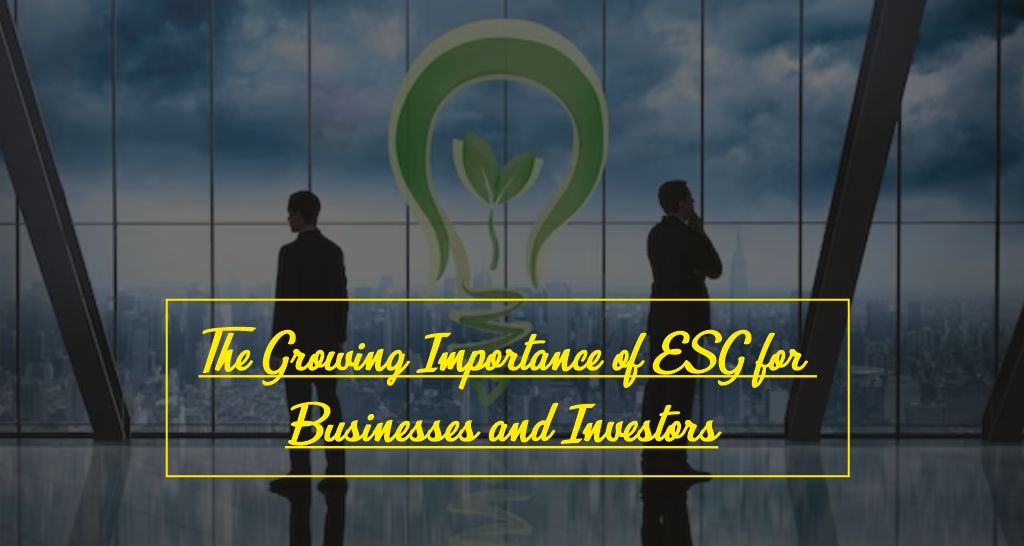ESG (Environmental, Social, and Governance) has become an undeniably significant arrangement of business norms and an urgent thought for financial backers lately. ESG alludes to the three focal elements used to quantify an organization’s or, alternately, speculation’s supportability and cultural effect. An ever-increasing number of customers and financial backers focus on organizations with moral, strategic policies and responsibilities to maintainability. As a result, incorporating strong ESG policies and practices has shifted from an ideological motive to a business imperative for competitiveness and profitability.
The Growing Investor and Consumer Focus on ESG
Societal shifts have driven the heightened focus on ESG in business and investing over the past decade. Climate change awareness, wealth and income inequality concerns, diversity and inclusion interests, and double-bottom-line investment priorities have converged to make ESG a foremost consideration for many consumers and investors.
Surveys consistently show the pull of ESG concerns for investors. For example, a 2021 survey by national law firm Foley & Lardner LLP found that 85% of investors factor ESG initiatives into their investment decisions. The survey also highlighted generational components – younger generations were significantly more likely to utilize ESG criteria than older generations. With millennials set to inherit trillions in wealth transfer in the coming decade, these survey results exemplify the growing demand for paramount ESG alignment in potential investments.
Moreover, customers progressively settle on buy choices from the perspective of an organization’s ESG responsibilities in regions like moral stockpile chains, impartial employing and pay rehearses, carbon impression and waste decrease objectives, and administration connected with issues like information security and straightforwardness. Companies that must satisfy ESG-focused consumers risk declining brand sentiment, lower engagement with their products and content, and reduced sales relative to competitors with robust ESG measures in place.
The Risks and Rewards for Businesses
The shifting societal preferences create risks and opportunities for businesses when focusing on ESG measures. On the risk side, companies who ignore growing demands for ethical practices, environmental sustainability, corporate citizenship, and strong governance face consequences like:
- Loss of consumer and investor confidence due to controversies or the appearance of “greenwashing” ESG credentials.
- Decreased appeal for top ability, particularly more youthful laborers focusing on liability and supportability.
- Supply chain and operations vulnerabilities if environmental policies like emissions caps start driving up costs of production inputs.
Crafting an Authentic ESG Strategy
Rather than viewing ESG as a constraint or public relations ploy, businesses should incorporate it as a central component of their strategy for driving sustainable growth while positively impacting society. Leadership and commitment from the C-suite and board are essential for ESG policies to permeate operations rather than existing merely as a “check the box” function.
Companies must actively set ESG goals, track quantitative metrics and benchmarks for performance monitoring, and transparently communicate progress regularly. Authentic strategies incorporate ESG factors into executive compensation programs and embed responsibility mandates at all company levels. Ethical personal conduct from leadership provides crucial behavioral modeling.
Organizations across businesses approach ESG, anticipating the most extreme pertinence to their tasks, esteem chains, and partner needs. For example, consumer brands focus more on responsible sourcing and fair labor policies in supply chains, while manufacturers concentrate on carbon footprint reduction from factories. Companies also tailor social impact programs to their capabilities – technology firms emphasize digital access initiatives and financial service providers fund financial literacy programs.
Investing with ESG in Mind
The prominence of ESG has transformed capital markets, with investment firms launching specially focused ESG funds and ETFs as the more expansive fund universe integrates ESG analysis into decision-making. According to the Global Sustainable Investment Alliance, assets directed to sustainable, responsible, and impact-focused investing platforms reached $17.1 trillion globally in 2021, over a third of the total professionally managed assets worldwide. All signs indicate the flow of investor capital to ESG-centric options will continue expanding rapidly.
Investor demand drives rigorous ESG measurement methodologies from rating agencies and data providers benchmarking company performance on material environmental issues, societal impact, and governance practices. Evaluations assist venture supervisors with examining security choice and portfolio development adjusted to explicit supportability targets. Companies with excellent scores on emissions management, adopting renewable energy, and mitigating environmental supply chain risks are among the targets of climate solutions funds.
Fund managers increasingly apply ESG criteria evaluating all holdings as fiduciary duty shifts to require material ESG incorporation. Failure to account for environmental disruptions, societal demands, ethical lapses, or governance controversies can directly undermine a company’s financial condition. Fund managers must analyze these ESG factors to safeguard against value destruction risk in investor portfolios like traditional financial statement analysis.
Along with third-party research inputs, investment managers engage directly with company management on ESG issues as active owners through proxy voting, filing shareholder resolutions, and pursuing dialogue to encourage improvement. Investor support has effectively provoked numerous enterprises to upgrade ESG exposures, set emanations decrease targets predictable with worldwide environment objectives, and further develop variety at the board and leader levels.
Conclusion
The developing significance of ecological manageability, social effect, and moral administration for organizations and financial backers will probably keep lifting ESG as a preeminent vital thought instead of a fringe capability. More consumers seek purpose-minded brands and investment vehicles aligned with their values. For corporate competitiveness, the ability to attract customer loyalty, premier talent, and investor capital increasingly depends on authentically pursuing ESG improvement across the entire organization.
Companies needing to establish ESG credibility face risks ranging from damaging controversies to reduced growth prospects. However, organizations adopting a coordinated strategy to ESG can construct starting points for persevering through progress by meeting partner assumptions, reinforcing activities, engaging representatives, and conveying maintainable long-haul esteem.
Frequently Asked Question
Why is ESG critical now?
Rising stakeholder focus on sustainability, social impact, and transparency necessitates authentic ESG commitment for competitive and financial performance.
What ESG issues matter most by industry?
ESG priorities for emphasis differ by a company based on the most significant risks and opportunities tied to their operations and value chains.
How could financial backers assess ESG accreditations?
Expert examination firms give organization appraisals across quantitative ecological, social, and administration benchmarks for financial backers to coordinate inside portfolio investigation.













Welcome To Biz Times Now
Welcome to Biz Times Now, the leading business magazine dedicated to providing invaluable insights and strategic guidance to top-level executives and managing personnel.